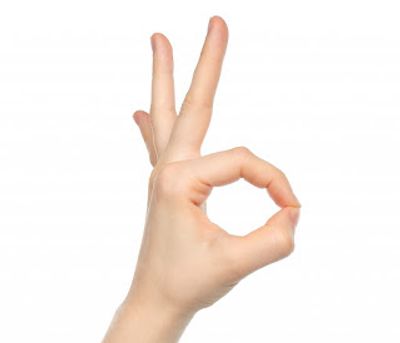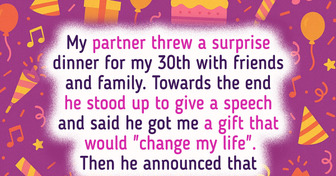Wow, that was interesting! Are there any people from Saudi Arabia? I would love to know if this fact it true! :D
I know, for example, that in Japan you are never allowed to walk around your home in shoes, you must wear slippers.

When going on a trip, experienced tourists learn information about the etiquette rules and the sights of the country they are going to visit. Because if you don’t know the subtleties of the rules that the locals have, you might find yourself in an awkward situation. For example, you might insult a French man if you use the “Okay” gesture with him. And if you eat a hamburger with your hands in Chile, nobody will sit next to you.
Bright Side wants to keep you safe from these situations with this article about the etiquette rules every tourist should know.
In Korea, no matter how hungry you are, you can’t start eating before the oldest person at the table does. If you violate this rule, you might not be invited back to eat at someone’s home. And one more thing: if you want to get yourself a drink, you will need to ask a person sitting right next to you. Koreans fill each other’s glasses.
Thai people are almost always smiling, which demonstrates their positive mindset. However, there is an ordinary thing that most people do that can ruin a Thai person’s mood in an instant. In Thailand, you can’t touch anyone’s head. And it’s not about the hair. It’s just that Thai people believe that the head is where the soul is.
In most countries, if you show someone your tongue, people will think that there is something wrong with you. And in India, this gesture demonstrates anger. In Tibet, this gesture is used to show respect and is also used as a “hello.” There is an opinion that the origin of this tradition is the belief that the devil has a black tongue. So, people in Tibet show that “We’re not one of them!”
Presenting flowers is a good thing in almost all countries. But there are details you should know. For example, in France, people think that lilies and chrysanthemums are for funerals. The same works for chrysanthemums in Italy: these flowers are used only on sad days. And lilies in Italy are a favorite, since they’re the national flower.
In many countries around the world, tips are included in the bill. This is true for the Czech Republic, France, Hungary, and Spain. On average, it’s about 10-15% of the bill. However, this rule doesn’t work for all European countries. In Austria, tips are only given to waiters who do their job well. And there is an unwritten rule in Austria: if a customer has asked for their bill 3 times and never receives it, they can leave the restaurant without paying.
One of the most amazing things in many countries is how people address each other. If you are walking in Hungary, don’t be angry if someone addresses you as a “cabbage” or “small insect.” They are not trying to mock you, these words are actually a compliment there. In many countries, their “compliments” might seem very weird. For example, in China, saying “diving fish, swooping geese” is a way to say someone is beautiful. People in Poland use the word “breadcrumb,” and in Japan, “egg with eyes” is also a term for an attractive person, making reference to their oval-shaped face.
And it’s not because they don’t want to accept a gift, it’s just their way of expressing modesty and good manners. By the way, in China, you can gift people with anything except for sharp objects, like knives (they are signs of the end of a relationship), watches (it is believed that watches mark the end of life), and handkerchiefs (which are a superstition connected with crying at funerals).
Instead of the usual handshake that we are used to, in Saudi Arabia and in the United Arab Emirates, men rub noses when they meet. There is also an unusual way to say “hello” in India: men bow to each other with their palms pressed together. In France, traditions depend on where you are. So, in different parts of the country, the number of kisses is different: in Paris, people kiss twice, and in Corsica — 5 times.
The famous gesture for “okay” is interpreted in Japan as “money” and in France as “zero.” So, even by using a small gesture, you can insult a French person by calling them “nothing.” You can get a bad response to the famous “rock & roll” gesture in Italy, since this means that a person’s wife is a cheater.
In Afghanistan and other Muslim countries, if you drop a piece of bread, you should pick it up as fast as possible and kiss it. There is no better way to express respect for food. Nobody is scared of germs here. So if you don’t want to have to do this, be careful and don’t drop anything.
It doesn’t matter where a Mexican person should be: a business meeting or a party with friends. They will be late either way. It is considered to be impolite to arrive anywhere on time. This national tradition has a very simple explanation: for a very long time, this country had big problems with public transportation, so being late has become a habit now.
It may be not very easy to stop drinking coffee in the Middle East. Most of the time, hospitable people will keep on refilling your cup as soon as they notice that it is empty. In order to stop this, you should shake the cup, tilt it several times, or just lay it on its side. This way, you will show that you’ve had enough coffee.
It seems perfectly logical to flip a fish once you’ve eaten one half. But in China, this is believed to bring bad luck. Local people, especially in the south of the country and Hong Kong, believe this. The most superstitious people leave the other side of the fish untouched, and others remove the bones to get to the other side.
Which of these etiquette rules would you like to adopt?
Wow, that was interesting! Are there any people from Saudi Arabia? I would love to know if this fact it true! :D
I know, for example, that in Japan you are never allowed to walk around your home in shoes, you must wear slippers.

Sticking your tongue out can be also taken as an insult in India! So, guys, be careful when you come to India :)
OK gesture might look innocent, but in Turkey it's a vulgar and very offensive sign

The 12 is not correct, be late is impolite, but is tolerated because is a bad habit in the country. Many of us (mexicans) are changing this habit.
Haha in Afghanistan you don't need to kiss food if you drop it you should just take it and place it in somewhere corner ? I live in Afghanistan and never done such thing?











